Hyundai Motor India Limited (HMIL) is the Indian subsidiary of South Korea’s Hyundai Motor Company. Established on 6 May 1996, HMIL set out to become a key player in India’s fast-growing automobile market. The company’s first model, the Hyundai Santro, launched on 23 September 1998, quickly became one of the country’s best-selling cars. Today, HMIL is led by Managing Director Mr Unsoo Kim, whose three decades of experience with Hyundai span global business planning, strategy, and operations. Under his leadership, the company has continued to innovate and adapt to Indian consumer needs, making it a household name across urban and rural markets alike.
| Company Summary |
|---|
| Founded in: 1967 |
| Primary Industry: Automobile |
| Other Industries: Industrial Machinery, Manufacturing |
| India Employee Count: 5k-10k |
| Global Employee Count: 1 Lakh+ |
| India Headquarters: Gurugram, Haryana, India |
| Office Locations: – |
| Website: www.hyundai.com |
HMIL’s manufacturing footprint in India is anchored by two plants in Sriperumbudur, Tamil Nadu, with a combined annual capacity of 600,000 units. Recognizing the need for growth, Hyundai is also developing a new facility in Pune, set to begin operations in late 2025 with an initial capacity of 170,000 units. A planned second phase will boost that plant’s output to 250,000 units, bringing total capacity across all sites to 850,000 units by 2026. These expansions support HMIL’s production target of 775,000 cars in 2024, up from 765,000 in 2023, positioning the company to better meet rising demand.
Over the years, Hyundai Motor India has built a diverse portfolio of models, from the compact i10 and mid-sized Verna to the popular Creta and Venue SUVs. However, intensified competition has weighed on its performance. As of the end of FY 2025, HMIL’s market share stood at 14%, its lowest level since FY 2013 due to underperformance of some models and strong gains by rivals. In April 2025, Mahindra & Mahindra even surpassed Hyundai as India’s second-largest automaker by dealer sales, underscoring the competitive pressure in the world’s third-largest car market.
To drive homegrown innovation, HMIL opened an R&D facility in Hyderabad in 2007, employing nearly 450 engineers. This centre supports vehicle development for Hyundai’s global R&D hub in Namyang, South Korea. On the manufacturing side, the company has pursued an indigenization roadmap, achieving up to 92% localization in its supply chain. Working with over 194 local vendors to source more than 1,238 components, HMIL’s “Atmanirbhar Bharat” commitment not only reduces costs but also strengthens India’s auto ecosystem by fostering skills and creating jobs.
Financially, Hyundai Motor India posted a Q4 FY 2025 profit of ₹1,583 crore, a 4% year-on-year decline, and declared an interim dividend to shareholders. Earlier, in 2024, HMIL raised US $3.3 billion through Asia’s largest IPO of the year, marking Hyundai’s first public listing outside South Korea. Despite mixed retail investor interest at the time, institutional support underscored confidence in HMIL’s growth prospects. The IPO proceeds have been earmarked for expanding production capacity and introducing new electric vehicle models in India.
Beyond business, Hyundai Motor India Foundation (HMIF), set up in 2006, oversees the company’s CSR initiatives. Under programs like “Dhyan-Do,” HMIF conducts health check-up camps and road-safety training for commercial vehicle drivers, combining mental-health counselling with safer driving habits. The #BeTheBetterGuy campaign further promotes responsible road behaviour through wide-ranging media engagement. These efforts align with Hyundai’s global “Creating Shared Values” vision, emphasizing community development, healthcare, education, and environmental stewardship across India.
HMIL aims to regain lost market share by doubling down on product innovation, electric mobility, and digital customer experiences. The Pune plant’s ramp-up, together with potential capacity expansions at Chennai, could push total output beyond one million units by 2028. New EV models, advanced safety features, and connected-car technologies are all on the roadmap. With a focus on affordability, localization, and sustainability, Hyundai Motor India is poised to navigate the challenges of a competitive market while contributing to India’s ambitions of becoming a global auto hub.

